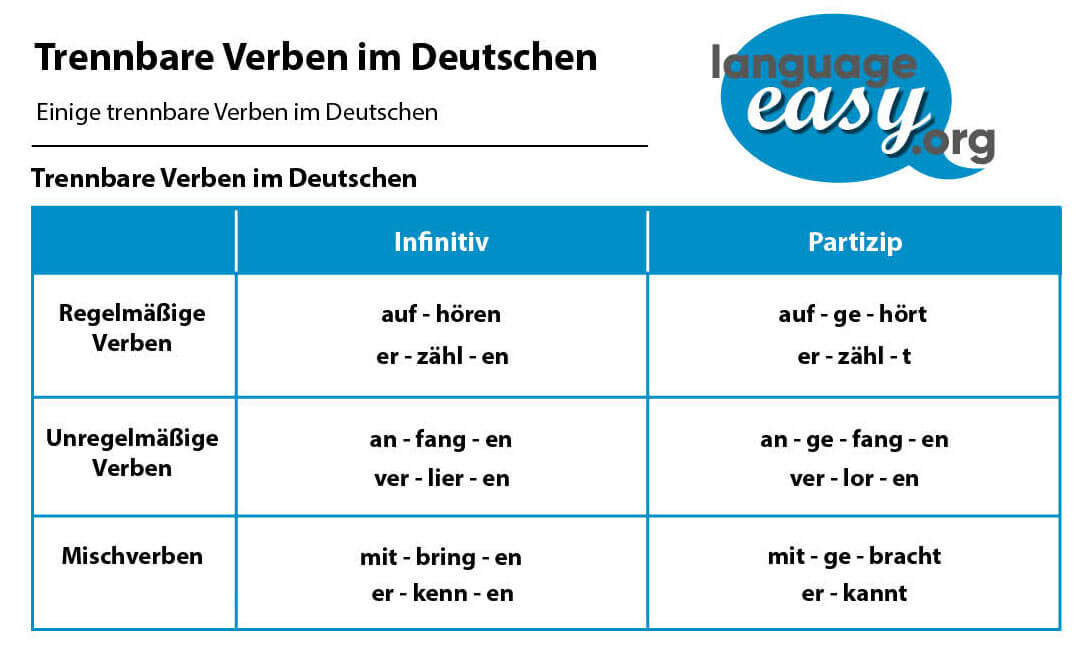The German Separable Verbs
Trennbare Verben im Deutschen – Erklärungen und Beispiele
The German Separable Verbs – Summary
Zusammenfassung
There are two types of compound verbs: separable and inseparable ones. Inseparable verbs contain prefixes, which don’t have a specific meaning.
Inseparable Verbs
- “be-, emp-, ent-, er-, ge-, miss-, ver-, zer-“
These prefixes are a fixed part in front of the verb, even of its finite form. The participle 2 form of this verb is formed without the prefix “ge-“.
Separable Verbs
Separable verbs contain mostly preposition put in front of them, which have an actual meaning.
- “ab-, an-, auf-, aus-, bei-, ein-, her-, hin-, los-, mit-, nach-, vor-, weg-, wieder-, zu-, zurück-“
In the finite form of the verb these prefixes are separated from the verb, mostly they are put at the end of the sentence. In its participle 2 form the “ge” is put between the prefix and the stem of the verb.
Inseparable and Separable Verbs
- “durch-, hinter-, über-, um-, unter-“
Some verbs with the prefixes you can see above are always separable, and other verbs with these prefixed can never be separated. But there are also verbs with these prefixes that can be separable and inseparable. But be careful – the meaning of these verbs change, depending on if they are separable or not.
Welcome to language-easy.org! Well, as you have clicked on this article, I suppose that you are ready to enter the depths of German grammar – and learn everything about German separable and inseparable verbs. Although you might think that a simple type of German verbs can not be of such a high importance, they definitely are. Well, just imagine the bunch of German words that consist of prefixes and their stem. So, in most cases, they mean changes, depending on which prefix you put there. And that’s why you should dominate this topic – in order to understand these varieties of different verbs and, of course, how to build them by yourself.
In the following, I’d like to give you a short idea of what German separable verbs and inseparable verbs actually are. After that, we will have a shot look at a list of some German separable verbs and inseparable verbs. Finally, there is a third group: Verbs that are both.
By the way, in case you’d like to have some background information about this topic – just have a look at this article on Wikipedia. Hopefully, it will provide you with all the additional information you are looking for.
And now, let’s not lose too much time and go straight to the first topic of this article: A short list of German separable verbs. Auf geht’s!
What are German Separable and Inseparable Verbs?
Was sind trennbare und untrennbare Verben im Deutschen?
So, first of all, let’s clear up what German separable and inseparable verbs actually are. Well, try to keep in mind the following description.
German separable and inseparable verbs are verbs whose meaning is altered by the addition of a prefix.
Of course, these prefixes are separated from their verb in the conjugated forms, whereas inseparable prefixes cannot be separated from their verb. So, the prefix determines whether a verb is separable or not.
German Separable Verbs
Trennbare Verben im Deutschen
Well, as already mentioned, whether a verb is separable or inseparable depends on its prefix. So, in the following I’d like to present to you a short list of prefixes that make verbs separable.
“auf-, an-, zu-, bei-, zurück-, nach-, mit-, los-, vor-, her-, hin-, ab-“
Of course, there are also some rules that come with German separable verbs. Well, as the short list of prefixes of separable verbs, please try to keep the following rules in mind, too.
- First, in the finite form, these verbs are separated from their prefix, which usually comes at the end of the sentence.
“aufwachen” – “Ich wache morgens auf.” - Second, in the past participle, we add “ge-” between the prefix and the verb.
“Ich bin gestern aufgewacht.”
Now, let’s illustrate these rules by some more examples:
- “Sehen” (to see):
– “Absehen” (to forsee) – “Ich sehe von einer Strafe ab.” - “Heben” (to lift):
– “hervorheben” (to bring out) – “Er hebt sich selbst hervor.” - “Waschen” (to wash):
– “Abwaschen” (to wash) – “Ich wasche ab.” - “Bringen” (to bring):
“beibringen” (to teach) – “Ich bringe meinem Sohn das Fahrradfahren bei.”
So, let’s come to the next point of this article about German separable verbs, a short list of inseparable verbs.
German Inseparable Verbs
Untrennbare Verben im Deutschen
So, in this part of this article I’d like to talk about the German inseparable verbs. Well, as in the part before, I’d like to show you the prefixes that make a verb inseparable. Of course, it is very important that you keep these prefixes in mind.
“über-, unter-, um-, durch-, hinter-“
Luckily, there are also some rules in the context of German inseparable verbs. Well, you will see that it can be really useful to remember the following rules.
- First, some verbs with these prefixes are always separable.
“umbringen” – “er bringt sich um” - Some other verbs with these prefixes are never separable.
“übertreiben” – “sie übertreibt es” - Some verbs with these prefixes can be either separable or inseparable. In this case, the separable verb and the inseparable verb have two different meanings.
“umfahren” – “Er fährt das Schild um.” – “Er umfährt das Schild.”
By the way, we stress the prefix in separable verbs and the syllable after the prefix in inseparable verbs.
Exercises
Übungen
Finally, we have reached the last part of this article where you can prove the German skills you have just learned. In the following you will see some phrases that you should complete with the correct terms. Once you have filled all the gaps, just click on the “correct” button and you can see your errors and the correct results. Good luck and… auf Wiedersehen!



